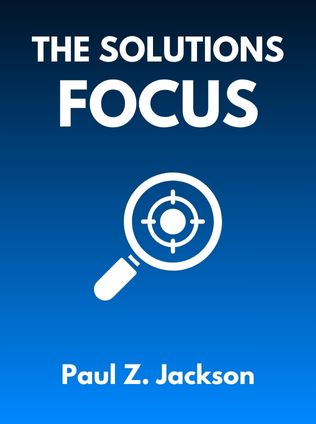
The Solutions Focus
Making Coaching and Change Simple
By Paul Z. Jackson,
Published 12/2006
About the Authors
Paul Z. Jackson is a consultant, inspirational trainer, and author, renowned for his work in applying solution-focused methods to organizational change and development. Mark McKergow, Ph.D., is an international consultant who writes on systemic thinking and neuro-linguistic programming (NLP). Together, they co-authored The Solutions Focus, providing a fresh approach to problem-solving by focusing on solutions rather than problems.
Main Idea
The Solutions Focus by Paul Z. Jackson and Mark McKergow introduces a methodology for achieving positive change by emphasizing solutions over problems, focusing on the future rather than the past, and leveraging what is already working. The book outlines the SIMPLE model, which includes six principles: Solutions, not problems; Inbetween - the action is in the interaction; Make use of what's there; Possibilities - past, present, and future; Language - simply said; and Every case is different. These principles are supplemented by practical tools to implement them effectively.
Table of Contents
- Introduction
- Key Principles and Tools for the Solutions Focus
- Solutions Not Problems
- Inbetween - The Action is in the Interaction
- Make Use of What's There
- Possibilities - Past, Present, and Future
- Language - Simply Said
- Every Case is Different
- Applications of the Solutions Focus
- Organizational Change
- Coaching Solutions
Key Principles and Tools for the Solutions Focus
The Solutions Focus is an innovative approach that shifts the focus from problems to solutions, emphasizing actionable change and the use of existing resources. Jackson and McKergow present the SIMPLE model, which encapsulates six principles designed to facilitate positive change in organizations and individuals.
"The Solutions Focus means avoiding the pointless search for what causes problems and instead provides a direct route that leads to a solution." - Paul Z. Jackson and Mark McKergow
The SIMPLE model stands for:
- Solutions, not problems
- Inbetween - the action is in the interaction
- Make use of what's there
- Possibilities - past, present, and future
- Language - simply said
- Every case is different
Solutions Not Problems
By concentrating on solutions, organizations can foster a more positive and proactive environment. This principle involves encouraging solution talk, negotiating solvable problems, and identifying change customers. Problem talk, which focuses on identifying the causes and effects of problems, often leads to a negative mindset and is generally unproductive. Instead, solution talk focuses on what is working and how to do more of it.
"Focus on the solution and the first signs of it appearing." - Paul Z. Jackson and Mark McKergow
Solution talk helps in bypassing endless problem discussions and instead, directs attention toward constructive outcomes. Building a Platform is essential to stop problem talk and focus on what can be achieved. This involves asking questions like "What do you want to accomplish today?" and "What skills and resources have you used to solve similar problems?" to steer the conversation toward solutions.
Sign up for FREE and get access to 1,400+ books summaries.
You May Also Like
The Subtle Art of Not Giving a F*ck
A Counterintuitive Approach to Living a Good Life
By Mark MansonRich Dad Poor Dad
What the Rich Teach Their Kids About Money - That the Poor and Middle Class Do Not!
By Robert T. KiyosakiHow To Win Friends and Influence People
The All-Time Classic Manual Of People Skills
By Dale CarnegieQuiet: The Power of Introverts
The Power of Introverts in a World That Can't Stop Talking
By Susan Cain



















